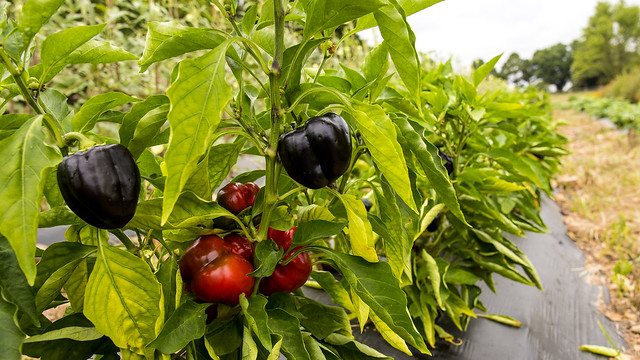Aug. 28, 2020
Farm training, apprenticeship programs help new and aspiring farmers put local foods on local plates
By Fred Miller
U of A System Division of Agriculture
@AgNews479
Fast facts
- Center for Arkansas Farms and Food focuses on local foods
- CAFF offers farm training, apprenticeships for new farmers
- Helps develop local food farms and food systems
(642 words)
Download related PHOTOS: https://flic.kr/s/aHsmQgxoh1
FAYETTEVILLE, Ark. — Those whose hands yearn for the dirt can learn to farm with classroom training and practical experience in two Center for Arkansas Farms and Food programs.
The University of Arkansas System Division of Agriculture center launches its first Farm School in January 2021. The second year of farm apprenticeships will begin in the spring. Registration for both programs begins Sept. 1.
The programs focus on small and mid-sized farms, specialty crop production and local markets in northwest Arkansas, said Heather Friedrich, program manager in the division’s department of horticulture. Both programs are open to anyone from any area of Arkansas. “We have connections with farmers in many areas of the state,” she said.
“Our goal is to increase the number of farmers and farms in Arkansas, improve farm viability and support our local food systems,” Friedrich said.
CAFF uses division research and outreach to support local food entrepreneurs and increases small farm viability. It is a center of the division’s Arkansas Agricultural Experiment Station and envisions a vibrant and diverse farm and food economy statewide, Friedrich said. Division of Agriculture faculty and staff manage CAFF programs in partnership with Northwest Arkansas Food Systems.
“Our goal is also to get local foods on local plates,” Friedrich said. “That’s good for farmers, and it’s good for consumers.”
Friedrich said CAFF addresses the need for a new generation of farmers to feed the state’s growing population. “The average farmer in Arkansas is age 57,” she said. “New farmers entering the field face significant obstacles, including a steep learning curve and access to land.
“CAFF’s goal is to support and expand the Arkansas food and farm economy,” Friedrich said. “These educational and mentoring programs will develop the next generation of Arkansas farmers and help them succeed.”
Farm School
The Farm School begins in January and is an 11-month, experiential learning program for beginning farmers of specialty crops or for those who want to learn how to grow food. The school includes both classroom curriculum and hands-on experience for integrating production, business and legal issues. Apprenticeships and outreach events offer continuing education to learn more about the skills needed for successful farming.
Students participate in approximately 350 hours of core knowledge in production, business and legal topics and 700 hours of hands-on field activities, Friedrich said. They will experience annual cropping systems on .5- and 5-acre scale fields, greenhouse production and perennial fruit production.
“Students gain an in-depth understanding of the farming production systems and business applications needed to succeed,” Friedrich said. “The Farm School prepares farmers to become specialty crop entrepreneurs, contributing to local and regional foodsheds in Arkansas.”
Farm Apprenticeships
The apprenticeship program matches new farmers or those who want to begin farming with mentors in their area of interest, providing hands-on learning experience on working farms, Friedrich said.
“Apprentices are carefully matched to farms based on their interests and learn alongside successful farmers, getting a taste of farm life before starting their own farm businesses,” Friedrich said.
Agreements signed by farm mentors and apprentices outline the terms of employment, and each on-farm experience is different, Friedrich said. The CAFF apprenticeship program lasts one to two seasons, depending on apprentice interests.
The program also includes education sessions at the Milo J. Shult Agricultural Research and Extension Center in Fayetteville, both before and during apprenticeships.
“Participants are required to take nine classes during the winter before their apprenticeships begin and three during the growing season,” Friedrich said. “This allows apprentices to share experiences with their classmates while applying what they learn in classes to real working experience.”
Information and registration
To learn more about the Center for Arkansas Farms and Food, or the Farm School and Farm Apprenticeships, visit the CAFF website: farmandfoodsystem.uada.edu. Registration for the programs will be open Sept. 1 through Oct. 30. Online registration:
- Farm School: https://uark.qualtrics.com/jfe/form/SV_6uk5zNcQdlbJr5X
- Farm Apprenticeship program: https://uark.qualtrics.com/jfe/form/SV_0d0ZTMKBmZeO4Jv
To learn more about Division of Agriculture research, visit the Arkansas Agricultural Experiment Station website. Follow us on Twitter at @ArkAgResearch and Instagram at ArkAgResearch.
About the Division of Agriculture
The University of Arkansas System Division of Agriculture’s mission is to strengthen agriculture, communities, and families by connecting trusted research to the adoption of best practices. Through the Agricultural Experiment Station and the Cooperative Extension Service, the Division of Agriculture conducts research and extension work within the nation’s historic land grant education system.
The Division of Agriculture is one of 20 entities within the University of Arkansas System. It has offices in all 75 counties in Arkansas and faculty on five system campuses.
Pursuant to 7 CFR § 15.3, the University of Arkansas System Division of Agriculture offers all its Extension and Research programs and services (including employment) without regard to race, color, sex, national origin, religion, age, disability, marital or veteran status, genetic information, sexual preference, pregnancy or any other legally protected status, and is an equal opportunity institution.
Media Contact: Fred Miller
U of A System Division of Agriculture
Arkansas Agricultural Experiment Station
(479) 575-5647
fmiller@uark.edu
Related Links
